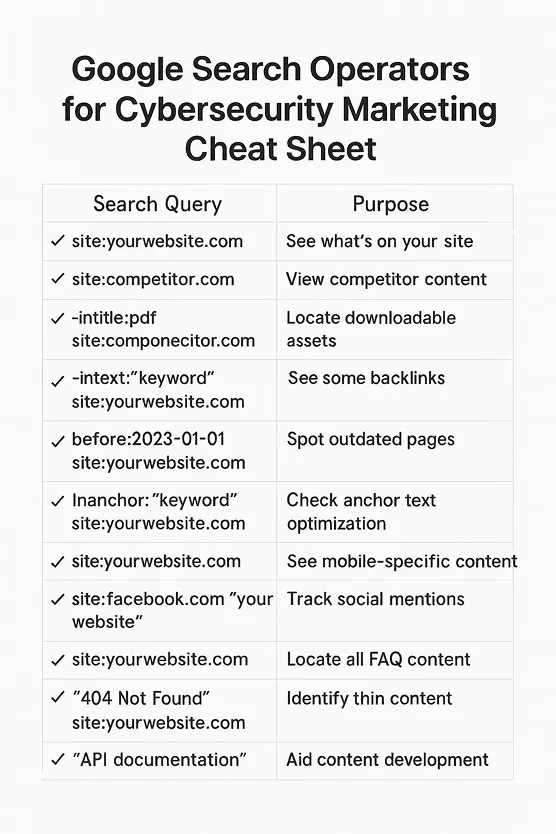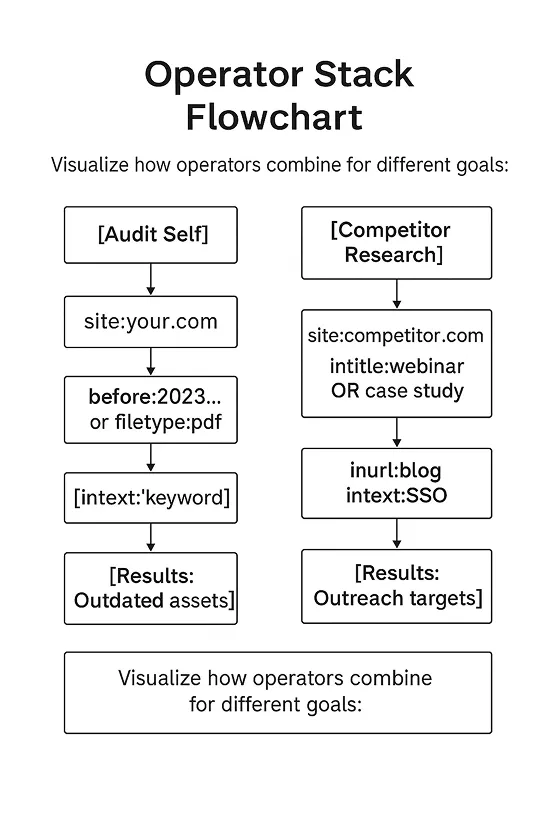You don’t need another $100/month SEO tool to audit your site, analyze competitors, or brainstorm new content.
If you’re a cybersecurity marketer looking for Google search operators for cybersecurity marketing or a B2B SaaS SEO practitioner, Google itself gives you everything you need—free—if you know how to ask.
Google Search Operators (a.k.a. “Google dorks”)—simple query modifiers that let you uncover gold: hidden PDFs, outdated content, broken links, competitor FAQs, and much more. If you’re new to this, our Complete SEO Checklist for 2026 is a perfect companion to this guide.
In this guide, we’ll break down:
- What operators matter for marketers
- Real, copy-paste examples you can use today
- Bonus queries your competitors probably don’t know
- Pro tips for faster audits & smarter campaigns

Why Should Cybersecurity & SaaS Marketers Care?
You’re not just writing blogs.
You’re building trust with technical decision-makers like CISOs and CTOs, pitching product-led value, and racing competitors for rankings. You’ll find that this mirrors the challenges outlined in our SEO fundamentals for cybersecurity companies. Here’s what these search operators help you do—quickly and without expensive tools.
- Spot outdated pages that could hurt trust
- Check competitor indexed content
- Audit your own keyword targeting
- Identify opportunities for backlink outreach
- Find content theft or duplicates
- Locate competitor webinars, whitepapers, or guides
You may also like: how cybersecurity marketing strategies are evolving in 2026
Common Google Search Operators for Cybersecurity SEO & B2B SaaS Audits
Google search operators like site: and filetype: are essential for a B2B SaaS SEO audit, helping you run competitor analysis tools efficiently and discover hidden opportunities through queries like site: vs filetype:.
| Operator | Use Case | Example |
|---|---|---|
site: | See what Google has indexed |
|
| Find pages with your topic in the title |
|
| Detect URL patterns or directories |
|
| Locate public PDFs, whitepapers, disclosures |
|
| Search inside article text |
|
| View last cached version forensics |
|
| Find precise mentions or quotes |
|
| Exclude terms, e.g., -marketing |
|
| Find similar sites |
|
| Search two terms near each other |
|
| Shows some backlinks (not complete but still handy) |
|
| Filters content before a date |
|
| Pages after a date (great for fresh competitors’ blogs) |
|
Real-World Examples of Google Search Operators for B2B SaaS SEO
These Google search operators double as competitor analysis tools and accelerate your B2B SaaS SEO audit. For example:
1. Track competitor thought leadershipsite:blog.fireeye.com intitle:"2026" intext:"ransomware"
filetype:pdf site:gov GDPR cybersecurity report
"write for us" "cybersecurity"
site:*.com filetype:csv "password" AROUND(3) leak
site:example.com inurl:resources cybersecurity -intitle:"404"
keyword" site:yourwebsite.com
site:competitor.com "FAQ"
site:workos.com intitle:"SSO setup"
site:yourwebsite.com -inurl:blog -inurl:product -inurl:about
filetype:pdf intitle:"pricing" site:competitor.com
Bonus: Advanced Google Search Operators for Cybersecurity Marketers
🔹 Find duplicate content for plagiarism protection:"your paragraph here" site:competitor.com
site:yourwebsite.com inurl:mobile
inanchor:"zero trust"
site:blog.yourwebsite.com
Custom Queries for Cybersecurity Use Cases
✅ Find security audit checklists by competitors
filetype:pdf intitle:"security checklist" site:competitor.com
✅ Look for breach reports or disclosures
intitle:"data breach report" site:competitor.com
✅ Identify competitor webinars / lead magnets
intitle:"webinar" OR intitle:"workshop" site:competitor.com
✅ Get an inventory of a competitor’s knowledge base
site:competitor.com/knowledge
✅ Locate API docs you could reference in integration guides
site:competitor.com intitle:"API documentation"
✅ Check your site's mobile-specific content
site:yourwebsite.com inurl:mobile
✅ See all PDFs Google indexed from .gov domains (trustworthy sources!)
filetype:pdf site:gov "cybersecurity"

Pro-Tip: Combine Operators for Advanced Insights
You can stack operators for hyper-specific searches:
🔸 Example:site:competitor.com intitle:"IAM" filetype:pdf before:2023-01-01
This would show all PDFs mentioning IAM on your competitor’s site published before 2023, perfect for finding outdated whitepapers you can update + outrank.
SEO Benefit: Why This Beats Keyword Tools
While some tools cost $99+/month, Google Search Tricks are free and ultra-specific. You’ll uncover:
- Low-competition, niche queries (e.g., “supply chain SEC filing PDF”)
- Spy on competitors' high-value assets (whitepapers, checklists)
- Locate backlink partners missed by automated tools — and if backlinks matter to your strategy (they do!), this guide to link-building for cybersecurity sites will help
Quick Action Plan
- 1️Save this list of operators.
- 2️Create a simple spreadsheet to track useful queries weekly.
- 3️Schedule 30 minutes each week to run these searches.
- 4️Prioritize updating or creating content based on what you find.
Want to go even deeper?
✅ Example goal: Find cybersecurity webinars or whitepapers your competitors published this year:
filetype:pdf intitle:"webinar" site:competitor.com
✅ Example goal: Spot outdated content to create fresher versions:
before:2023-01-01 intitle:"ransomware" site:competitor.com
Quick Audit Checklist for Marketers (borrow a few ideas from our step-by-step SaaS SEO growth guide too)
| Task | Google Search Query | Purpose |
|---|---|---|
Weekly Index Check |
| Ensure all key pages are properly indexed by Google. |
Old Content Finder |
| Identify outdated content for refresh/update. |
404 Page Scan |
| Quickly locate pages returning 404 errors. |
Competitor Analysis |
| Analyze competitor’s freshest blog content. |
Content Theft Check |
| Check if competitors copied your content. |
Pro Tips from the Trenches
- Mix
site:withfiletype:to uncover the most-shared reports. - Use
-marketing -solutionto skip fluff and get to technical assets.
Try advanced combos like:
site:linkedin.com/in intitle:"CISO" "cloud security"
- for personal research and outreach.
Real-Life Example: SSOJet vs. Gracker
Generic “SSO benefits” content? Yawn.
SSOJet’s migration tools and calculators drove 642% more organic leads and cut enterprise sales cycles by 39%.
You can steal that play
Try:
site:ssojet.com intext:"Calculator"
Then build:
- Cost‑comparison widget
- Timeline planner
- Security audit checklist
… and make your page irresistible to search and to prospects.
Conclusion: Google Is Your Secret Weapon
Marketers who know how to use Google smarter win faster—especially in competitive spaces like cybersecurity and SaaS.
You don’t need dozens of tools to stay sharp. Just bookmark this page, run 2-3 of these queries every week, and start collecting insights that help you outrank competitors, refresh content, and close the gap.
FAQs
1. How to use Google search operators for marketing PDF?
You can quickly audit your marketing PDFs by running this query:
filetype:pdf site:yourwebsite.com
This lets you find all PDF resources on your website. It’s useful for checking if outdated lead magnets or guides are still discoverable in Google. Marketers also use this to see which PDF files competitors have indexed by tweaking it:
2. How to use Google search operators for marketing examples?
Here are real-world marketing examples of using search operators:
- Find all blog posts about a topic:
site:yourwebsite.com intext:"lead generation" - Check indexed pages from a specific period:
site:yourwebsite.com after:2024-01-01 - Spy on competitors’ landing pages:
site:competitor.com intitle:"case study"
These help you optimize SEO, audit competitor content, and quickly research without tools.
3. Google Search Operator Full List
Google doesn’t publish an official full-list PDF but marketers often build their own for reference. Some common operators for your checklist:
site:intitle:inurl:intext:filetype:before: / after:related:cache:define:OR""(exact match)
4. What is Google Operator AI?
No official "Google Operator AI" exists, but marketers use Google operators + AI tools (like ChatGPT or GrackerAI!) to:
- Research indexed content
- Identify SEO gaps
- Feed search results into AI for summaries
- Validate backlinks or audit competitor sites programmatically